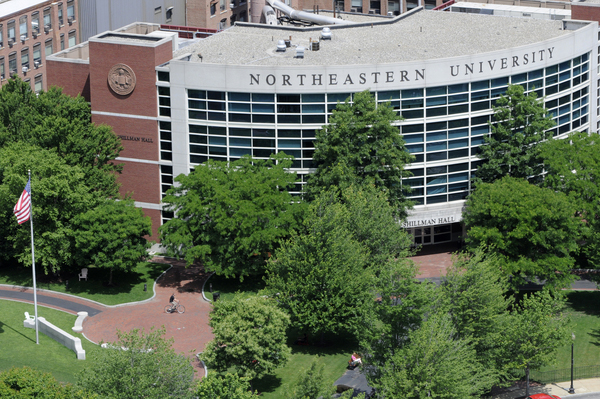Northeastern ranked America’s greenest university

Northeastern University’s long-standing commitment to sustainability has once again garnered global acclaim: In rankings released earlier this month, Northeastern placed third among 301 schools from 61 countries in the University of Indonesia’s fourth annual GreenMetric Ranking of World Universities. Northeastern placed first among all American universities in the rankings.
The international list ranks higher education institutions based on campus sustainability and environmentally friendly university management. The results derive from self-reported data in six weighted categories: energy and climate change; setting and infrastructure; waste management; transportation; education; and water usage.
Northeastern has ranked among the list’s top four universities since the inaugural rankings in 2010, when Northeastern placed fourth among 95 higher education institutions. Since then, the number of participating universities has increased threefold.
Northeastern President Joseph E. Aoun shared the news on Twitter, tweeting, “Green. Green. Green. Northeastern is black, red, and green.”
Northeastern’s latest achievement aligns with its ongoing commitment to becoming a greener institution. In 2007, the university became a founding member of the American College & University Presidents Climate Commitment, a nationwide initiative to neutralize greenhouse gas emissions among institutions of higher learning. Three years later, Northeastern officially adopted a climate action strategy called “Sustainable Action Plan: Roadmap towards Carbon Neutrality.” The university is also a member of the Clinton Global Initiative University Network and recently signed the Green Chemistry Commitment—a promise to graduate chemistry majors with knowledge in the theory and practice of developing environmentally responsible chemicals.
Northeastern’s dedication to environmental sustainability is also reflected in its teaching and research. Sustainability is one of the university’s primary academic thrusts, a programmatic pillar of its robust research program. Faculty members leverage the efficacy of use-inspired interdisciplinary research to discover solutions to global challenges ranging from extreme weather and water scarcity to energy efficiency and urban coastal sustainability. Students, for their part, strive to tackle these challenges through innovative course work, interdisciplinary research projects, and high-impact experiential learning opportunities.
Several students groups aim to practice and promote sustainability at both the campus and community levels. The Husky Environmental Action Team, for example, is working toward campus-wide environmental sustainability and carbon neutrality in conjunction with the university’s administration.
HEAT’s executive director, Mara Scallon, S’16, praised Northeastern’s commitment to sustainability. “Over the last few years, Northeastern has done a lot of tremendous work to improve sustainability on campus and I’m happy to see they’re working with us to continue our efforts,” she said. “I hope the university [takes its success] as a challenge to raise the bar and increase its standards.”
The university’s campus-wide sustainability initiatives touch the lives of students, faculty, and staff each and every day. Two of the seven 3-Star Certified Restaurants in Massachusetts are located on campus—the International Village Dining Hall and Peet’s Coffee and Jamba Juice. Northeastern is also the nation’s first college or university to earn both the 3-Star Certified Green Restaurant distinction and LEED Gold Status.
Since joining the President’s Climate Commitment in 2007, the university has saved approximately 10 million kilowatt hours of electricity. One of the latest energy-saving projects is taking place at the Egan Research Center, where technological upgrades will lead to annual energy savings of approximately 1 million kilowatt hours of electricity and reduce water consumption by more than 2 million gallons per year.
In 2012, the university recycled more than 300 tons of paper and corrugated cardboard, 260 tons of landscape compost, 100 tons of bottles and cans, 51 tons of computers and electronics, and 12 tons of cooking oil while its “Compost Here” program turned food waste into nearly 600 tons of compost. Over the last year, the university has installed more than 150 filtered water stations in buildings across campus, helping to eliminate waste from hundreds of thousands of disposable plastic bottles.





